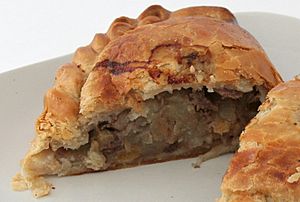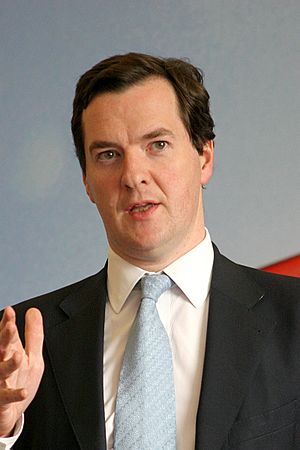Pasty tax facts for kids
The "Pasty tax" was a well-known name used by the British news to describe a plan from the 2012 United Kingdom budget. This plan aimed to make the tax rules simpler for "hot takeaway food." It would have meant that Value Added Tax (VAT) would be charged at 20% on all such food. This change would have made hot snacks like sausage rolls and Cornish pasties more expensive if they were sold hot where they were baked. George Osborne, who was the Chancellor of the Exchequer (the person in charge of the country's money), announced this plan.
Why the "Pasty Tax" Idea Came Up
For a long time, the rules about VAT on food were a bit tricky. Most food you buy to eat or cook at home has no VAT charged on it. However, meals eaten in a restaurant or hot takeaway food and drinks usually have a 20% VAT added.
The problem came with food that was baked and sold while still warm. Was it a hot takeaway, or was it just cooling down? For example, freshly baked bread has no VAT. But what about pies or pasties that are hot from the oven?
The old rules said:
- If food was sold specifically to be eaten while still hot, it had VAT.
- If it was warm just because it had just been baked and was cooling down, it had no VAT.
This caused a lot of confusion and arguments. Businesses sometimes went to court to argue that their food was hot only by accident, not because it was meant to be eaten hot. The government wanted to make these rules clearer. They suggested that all food sold above room temperature should have VAT, except for freshly baked bread. This would make sure all hot takeaway food was taxed the same way.
People Against the "Pasty Tax"
When the idea of the "Pasty tax" came out, many people were unhappy. Several campaigns started to try and stop the tax on the Cornish pasty. For example, The Sun newspaper started a campaign called "Who VAT all the pies." The Cornish Pasty Association also created an online petition called "Don't Tax My Pasty."
A politician from the Labour Party, John Mann, asked George Osborne when he had last eaten a Cornish pasty. Osborne said he couldn't remember. People used this to say that the Conservatives were "out of touch" with everyday people.
The Prime Minister, David Cameron, then said he had recently eaten a Cornish pasty at Leeds railway station and liked it. However, it turned out the pasty shop at that station had closed two years earlier!
This issue, which seemed small at first, became a big topic in newspapers and among political experts. The tax would affect both customers and businesses. Greggs, a large bakery chain, warned that the tax could hurt their business and cause shops to close. Over half a million people signed petitions against the tax.
Newspapers and commentators made fun of David Cameron's attempt to seem like a regular pasty eater. They also joked about George Osborne not remembering his last pasty. Cameron tried to defend the tax, saying it would help small takeaway restaurants compete with bigger chains.
The "pasty tax" was one of the reasons Ed Miliband, the leader of the Labour Party, called the 2012 budget an "omnishambles." This word means a complete mess or disaster. It was first used in a TV comedy show called The Thick of It. The word became very popular and was even added to the Oxford English Dictionary in 2013.
What Happened Next
After all the public complaints, George Osborne changed the plans for the "Pasty tax" in late May. This change was called a "U-turn," which means a complete reversal of a decision.
A study in 2014 looked at the "Pasty tax" situation. It showed that even small changes to tax rules can be very difficult to make. It also suggested that this event might have made it harder to make other tax changes in the future. Another article in 2014 argued that the strong reaction to the "Pasty tax" and a similar "fat tax" in Denmark made politicians less likely to try new taxes on food. These taxes were sometimes suggested to help fight obesity.
However, in 2018, the UK did introduce a "Soft Drinks Industry Levy" on sugary drinks. This tax was specifically designed to help prevent childhood obesity. This time, the tax was much more successful.
 | Madam C. J. Walker |
 | Janet Emerson Bashen |
 | Annie Turnbo Malone |
 | Maggie L. Walker |



